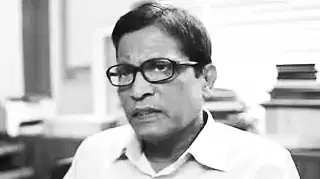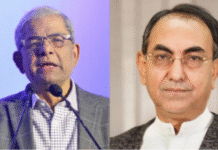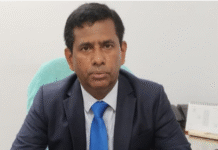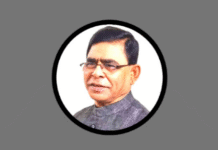
Professor M Shamsul Alam is an energy expert, dean of Daffodil University’s faculty of engineering and energy adviser of the Consumers Association of Bangladesh (CAB). In an exclusive interview with Prothom Alo, he speaks about the present state of the country’s energy sector, including the crisis it faces and its potential.
The main obstacle to the development of the country’s power sector is weak planning and policies. The government’s plans are not in keeping with reality. The crisis in the sector has been created because business interests were put before consumers’ interests. There is no consistency between the demand and generation capacity of electricity. The continuous increase in generation, transmission and distribution has pushed costs up. On the other hand, the people only have limited consumption of electricity and so less power is being used. This increases distribution costs. With this increased financial deficit, both subsidy and expenses are being increased.
These observations were made by energy expert M Shamsul Alam in an a recent interview with Prothom Alo. M Shamsul Alam is the dean of Daffodil University’s faculty of engineering and energy adviser of the Consumers Association of Bangladesh (CAB).
While the government claims extensive development in the power sector, M Shamsul Alam maintains that there has been no development in the sector in the true sense. On the contrary, it is steeped in crises. “There is frequent load-shedding outside of Dhaka due to the weak distribution system,” he pointed out.
He said that power supply had been increased illogically and unjustly. It is said that power production has been decreased to reduce subsides, but in actuality power outages continue uncontrolled despite generation, transmission and distribution capacity exceeding demand. He cited the example of 25 dollars being spent to purchase a meter costing only 10 dollars, for which Tk 40 is added to the monthly electricity bill of less than Tk 30 of a marginal user.
He said in the projected plans, the matter of increasing oil-fired power production had been dropped, but even so the increase of oil-fired power production continued unabated.
Government power production was reduced due to the gas crisis, yet the private sector power plants were using gas and selling power at high costs. M Shamsul Alam went on to say that instead of using its own gas and oil resources at thrifty rates, the government was placing more importance on producing power with imported coal, LNG and oil. All in all, the developments in the power sector were not at all consumer friendly or public friendly, but conducive to unscrupulous business.
Opportunists made billions of taka in profits from the unscrupulous business of rental and quick rental power plants.
When asked about the power sector master plan drawn up in 2010, the energy expert said that the plan had been devised along with the Japanese agency JICA. Now it is funding Japanese contractors to supply coal to the coal-fired power plants in Bangladesh. Even the coal terminal is being built with Japanese funds. Japan has gained big business centering on the coal-fired power. That would not have been a problem if they were not involved in the master plan. It would not have been a conflict of interests. But it is now apprehended that the costs of the coal-fired power will be extremely high. It is unfortunate that we cannot use our own experts to draw up a master plan. We do not value our national competence.
Coming to the issue of rental and quick rental power plants, which the government is now thinking of closing down, M Shamsul Alam said that the government had used the power crisis as an excuse to give many companies this business. The concept of rental power plants goes against the national interests. The government bought electricity from these companies at prices much higher than production costs. They were given the facilities of importing fuel oil at 10 per cent service charge, which facilitated them to run oil business alongside their power business. Opportunists made billions of taka in profits from the unscrupulous business of rental and quick rental power plants. “We had said that there was no need for rental and quick rentals,” he asserted, “If PDB’s capacity was increased, they could have generated the additional power.”
The government was adopting all sorts of strategies to advance towards this goal, the energy expert continued. The government was doing this under pressure or advice of the donor agencies, even though it went against national interests.
“Analysis and studies indicate that the price of power can be reduced. It does not have to be increased,” said Shamsul Alam, adding that the power and energy sector could be made self-reliant financially and technically. Oil prices had plummeted in the global market and so there was no reason for the cost of electricity to go up. He said, given the funds of the various energy-related agencies, along with the gas and power development funds and the energy security funds, it would be very easy to earn financial and technical self-sufficiency in the sector.
For this, he said, all that was needed was a change in government policy. It was because of corruption and pilferage that the people were being deprived of power and energy at the correct price, the correct amount and the correct quality.
We don’t show interest in solar energy saying that it costs too much, but actually this is just to protect the interests of the subsidy-dependent grid power business.
When asked about a way out from the power sector problem, the CAB energy advisor said that there was an easy way out. He said, “Petrobangla was created after the country’s independence to make the energy sector self reliant. But the consecutive governments made it more dependent on others. Bureaucrats shouldn’t decide on how the power sector should run. The Bangladesh Energy Regulatory Commission (BERC) and the power division can be consulted. Consideration must be given to how the country’s resources can be protected, how power can be made easily accessible to the people. If the energy sector is run on advice from outside, that will spell disaster for the country. The government must not see this as a business. Government bureaucrats were made chairmen of state-owned energy and power companies. They will not uphold national interests. They must first be removed from the boards of these companies.”
While the whole world is looking towards renewable energy, Bangladesh is lagging behind. Why?
Shamsul Alo also blames this on the government’s wrong policies. Many countries like Italy use rooftops to produce solar energy and most of the demand was met by that power. “We don’t show interest in solar energy saying that it costs too much, but actually this is just to protect the interests of the subsidy-dependent grid power business,” he said.
He went on to say that it was possible to produce and supply solar power locally, but the consumers instead were being connected to the national grid at high costs. “Power supply though the national grid offers more scope for misappropriation of money,” the energy expert said, “We have increased oil-fired power generation by 30 percent, we are giving subsidies, and the people are bearing the burden.”
Bhola has a lot of gas. Money could be saved if BAPEX extracted it, he said, pointed out that the costs had gone up as foreign companies had been given the contract. “And when the purchase price from the foreign companies would prove to be high, then it would be said there is no need for this gas, it is better to import it,” he said.
“The demand of the entire southwestern region including Khulna could have been met with the gas from Bhola. There would be no need for oil-fired power generation.” He pointed out that even without ascertaining the source of gas, billions of taka was being spent on laying gas distribution and supply lines in the southwest region.









